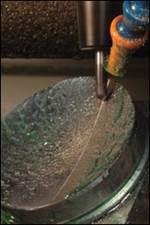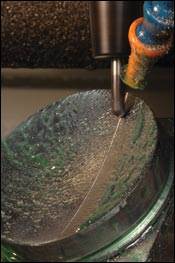Tooling Board Features Excellent Dimensional Stability, Easy Cutting
This EB6200 high-temperature epoxy tooling board—developed by BCC Products Inc./Blehm Plastics (Franklin, IN)—was built for the composites industries.
A new tooling board has been developed that features superior surface finish and dimensional stability (because of its low coefficient of thermal expansion and high glass transition temperature)—along with the ability to maintain tolerances even after being subjected to temperature variations. According to BCC Products Owner Roger Brunette, for years mold/model makers have used various materials in the process of building composite parts. “With the development of high temperature epoxy tooling blocks the time and cost have greatly been reduced,” he explains. “Compared to aluminum, costs have been reduced due to its high costs of material and machine times are quicker. When comparing to traditional hand layup, tooling steps are removed and parts can be produced much quicker.”
This EB6200 high-temperature epoxy tooling board—developed by BCC Products Inc./Blehm Plastics (Franklin, IN)—was built for the composites industries and built to the standards of all of the manufacturer’s products, for performance and durability. According to Brunette, this material “is designed to serve the needs of those using prepreg in the construction of tools for composite parts. Composite parts are developed by using epoxy, vinyl ester, polyester resins or rapid injection resins to build strong, durable parts or complete sections. Extensive testing has been completed that shows that the EB6200 at high temperature ranges has minimal adverse effects on its performance, even in the range of 325°F (163°C).” See the accompanying chart for results of heat distortion.
Features
This tooling board features a shore hardness of 72D and a density in the 47lb/ft3 range, Brunette explains. “This grain-free, elevated temperature epoxy modeling material is becoming the favorite among epoxy board users,” he says. “EB6200 is found to have a better surface aspect quality and its ability to remain relative unchanged to its original hardness during temperature range elevations. Additionally, the material features excellent cutting performance.”
Most model and tooling boards are made from polyurethane-formulated resins, notes Brunette. “Epoxy tooling board has been around for years but used typically in aerospace applications and rarely in automotive design or general tooling,” he states. “In these cases the model/moldmakers take a carbon fiber tool negative off these polyurethane masters. Today with epoxy tooling boards the CNC operator can cut the negative from their CAD data and have an epoxy tool for their application from epoxy tooling boards.”
BCC/Blehm’s tooling board is formulated for excellent surface cutting compared to other formulated epoxy boards, so when cut on NC equipment the product generates less dust. This aspect allows for easier clean-up and less abrasion to cutting tools. “It creates little dust—thus saving on cutting tools and on clean-up after cutting,” Brunette emphasizes.”
Applications
The tooling board’s applications include automotive die models, master models (aerospace), vacuum forming at elevated temperatures; lay-up tools for medium- and high- temperature curing prepreg. Industries served include aerospace, motor-sport and automotive. It is available in dimensions of 2 x 24 x 60 in., 4 x 24 x 60 in., and 6 x 24 x 60 in. (51, 102, and 152 x 610 x 1,524 mm).
This tooling board has been a long time coming, Brunette concludes. “This tooling board is built to perform where other manufacturer’s similar products can’t perform,” he stresses. “It gives results when the user needs them. Those looking for a high-temperature tooling board instead of hand layup of cloth will become to enjoy the ease at which this product performs when they need performance.”
Related Content
Coating Technology Enables Tough Mold and Die Steel Machining
Millstar, a part of Cole Tooling Systems, presents a multi-layer hybrid nanocoating for cutting tools that provide key benefits for increased efficiency in any machining operation.
Read MoreMicro-Milled Steel Plate Cuts Mold Build Times by 10-15%
Steel 21 emphasizes its tighter tolerances, improved surface quality and speed of processing using the patented “21 Micro Milling” process.
Read MoreVIDEO: AM Powder Addresses Current Inefficiencies, Sustainability and Skills Gap
Steel supplier discusses high thermal conductivity metal powders that also address the skills gaps via user-friendly materials and promote sustainability via durability and higher cycle counts.
Read MoreAdvancing Moldmaking and Plastics: Trends in 3D Printing, Automation and Sustainability
NPE 2024 showcased the latest trends and technologies in innovation, efficiency and sustainability for moldmakers and molders, featuring advancements in 3D printing, automation, design and virtual reality/augmented reality/artificial intelligence.
Read MoreRead Next
VMCs Provide Improved Surface Quality for Eyeglass Lens Molds
Carl Zeiss Vision improves crucial surface quality of its polycarbonate eyeglass lens molds and designed repeatability and added capacity into their metal mold operation.
Read MoreAre You a Moldmaker Considering 3D Printing? Consider the 3D Printing Workshop at NPE2024
Presentations will cover 3D printing for mold tooling, material innovation, product development, bridge production and full-scale, high-volume additive manufacturing.
Read MoreHow to Use Strategic Planning Tools, Data to Manage the Human Side of Business
Q&A with Marion Wells, MMT EAB member and founder of Human Asset Management.
Read More

















